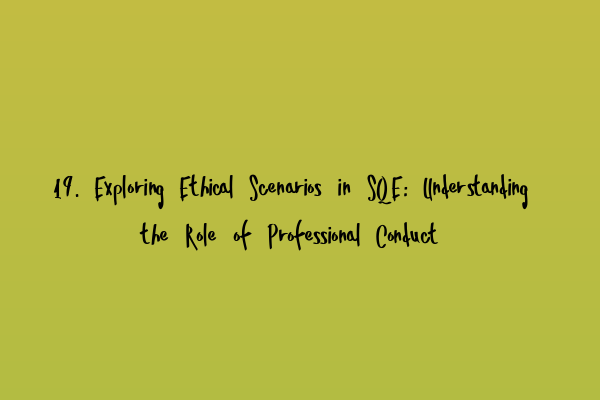Exploring Ethical Scenarios in SQE: Understanding the Role of Professional Conduct
Welcome to SQE Exam Law, your trusted source for all things related to the Solicitors Qualifying Examination (SQE) and legal practice. In today’s article, we will be diving into the topic of ethical scenarios in the SQE and exploring the crucial role that professional conduct plays in the legal profession.
Ethics lies at the heart of the legal profession, defining the behavior and responsibilities of solicitors. Understanding and applying ethical principles is not only essential for success in the SQE exams but also for building a strong foundation for a successful legal career. Let’s delve deeper into this fascinating subject!
Why Are Ethical Scenarios Important in the SQE?
The SQE places a significant emphasis on testing candidates’ understanding of and ability to apply ethical principles in real-life scenarios. This is because ethical dilemmas frequently arise in legal practice, and solicitors must navigate these situations while upholding their professional responsibilities.
By integrating ethical scenarios into the SQE exams, the examination assesses a candidate’s ethical awareness and decision-making skills, ultimately ensuring that future solicitors are equipped to handle the complexities of legal practice.
The Role of Professional Conduct in the Legal Profession
Professional conduct refers to the ethical standards and behaviors that solicitors are expected to uphold in their practice. It encompasses a wide range of principles, including integrity, confidentiality, competence, and loyalty to clients. Professional conduct not only protects the interests of clients but also maintains the reputation and integrity of the legal profession as a whole.
In the SQE exams, candidates are tested on their knowledge and understanding of professional conduct rules, such as those outlined in the Solicitors Regulation Authority (SRA) Code of Conduct. It is crucial for aspiring solicitors to grasp these rules and apply them in various scenarios to demonstrate their ethical judgment and professionalism.
Exploring Ethical Scenarios in SQE
The SQE’s focus on ethical scenarios aims to assess a candidate’s ability to identify ethical issues, analyze them effectively, and propose appropriate solutions. Let’s explore some common ethical scenarios that may arise in the SQE exams:
- Conflicts of Interest: Candidates may be presented with a scenario where they have to navigate conflicting interests between multiple clients or between a client and their personal interests. The ability to identify conflicts and appropriately manage them in compliance with professional conduct rules is essential.
- Client Confidentiality: The issue of maintaining client confidentiality frequently arises in legal practice. Candidates may encounter scenarios testing their understanding of the duty of confidentiality and the circumstances in which it can be breached.
- Handling Client Funds: Solicitors often deal with client funds and must adhere to strict rules governing their management. Applicants may face scenarios where they need to demonstrate their understanding of the rules and their ability to handle client money responsibly.
- Communication and Engagement: Effective communication and engagement with clients are vital aspects of legal practice. Ethical scenarios may focus on candidates’ ability to maintain open and transparent communication, provide realistic advice, and manage client expectations.
- Professional Boundaries: The SQE may explore scenarios involving the maintenance of appropriate professional and personal boundaries. Maintaining professionalism, avoiding conflicts of interest, and ensuring neutrality when required are crucial elements to consider in such scenarios.
These are just a few examples of the ethical scenarios that candidates may encounter in the SQE exams. It is essential to develop a comprehensive understanding of professional conduct rules, as well as the ability to analyze and apply them effectively in a variety of situations.
Preparing for Ethical Scenarios in the SQE
Now that we understand the significance of ethical scenarios in the SQE, how can candidates best prepare for them? Here are a few strategies to consider:
- Study the SRA Code of Conduct: Familiarize yourself with the rules and principles outlined in the SRA Code of Conduct. Highlight key sections related to professional conduct and ethical responsibilities.
- Practice SQE case studies: Case studies can provide a practical way to develop your understanding of ethical scenarios. Consider using SQE Case Studies: Applying Knowledge in Real-Life Scenarios to enhance your preparation.
- Seek professional guidance: Consulting with experienced solicitors or legal professionals can provide valuable insights into ethical decision-making. Their expertise and real-life experiences can help you navigate complex scenarios.
- Review and analyze mock exam results: Analyzing your performance in mock exams can help identify areas of improvement. Take note of ethical scenarios where you struggled and focus on strengthening your understanding in those areas. Check out our article on Analyzing Mock Results for SQE: Identifying Areas of Improvement for more tips.
Conclusion
Aspiring solicitors must recognize the crucial role that professional conduct plays in the legal profession. Ethical scenarios form a significant part of the SQE, ensuring that candidates possess the necessary ethical awareness and decision-making skills to navigate complex situations in legal practice.
By understanding professional conduct rules and practicing ethical scenarios, you can equip yourself with the knowledge and skills needed to succeed in the SQE exams and build a successful career in the legal profession.
For more information on the SQE and other strategies to excel in the exams, explore our related articles:
- Solicitors Qualifying Examination (SQE): Your Gateway to Legal Practice
- Mastering Time Management in SQE: Strategies for Efficient Exam Completion
- Conquer the Multiple Choice Questions (MCQ) in SQE1
Remember, ethical scenarios are not only a part of the SQE exams but also an integral component of your future legal career. By mastering the principles of professional conduct, you can demonstrate your commitment to ethical practice and make a positive impact in the legal profession.
